An event to raise funds for earthquake relief in Myanmar was held at Tha Phae Gate in Chiang Mai, Thailand, on June 22. The Myanmar Centre at Chiang Mai University (CMU), in collaboration with the Myanmar community in Chiang Mai, organized the event. Read more and check out our photos.
‘We gather, We heal’ for Myanmar earthquake relief
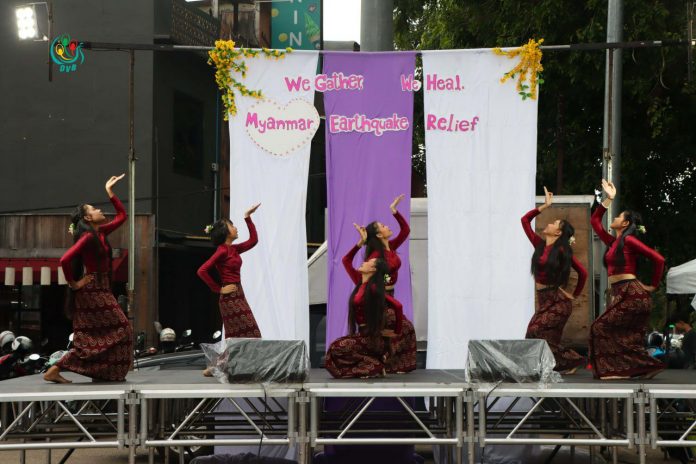
Are Rohingya returning to Myanmar from the refugee camps in Bangladesh?
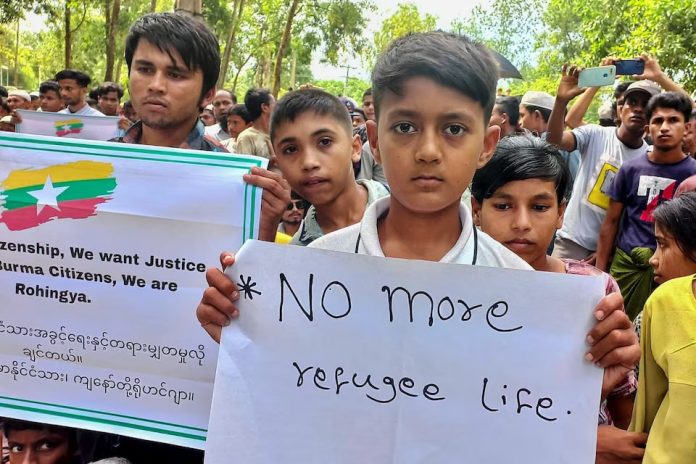
Some Rohingya living temporarily at refugee camps in Bangladesh have been returning to their villages and towns in northern Arakan (Rakhine) State with their families due to the increasing hardships faced by life in the camps, according to a Rohingya refugee currently staying at Kutupalong camp who spoke to DMG.
The World Food Programme (WFP) was previously providing each Rohingya refugee in Bangladesh with a monthly allowance of $12.50 USD, but this was reduced to $6 USD per month in April.
This has made the lives of the Rohingya in the refugee camps, who were already suffering from livelihood challenges, even harder. As a result, some of them have decided to return to their homeland in Arakan.
“Refugees aren’t allowed to leave the camp to work outside. For families with many members and children, the WFP support just isn’t enough. That’s why some families have started returning to their native Arakan,” the Rohingya refugee told DMG on the condition of anonymity.
“But for now, it’s still just a small number. Only those who are sure they can’t survive here any longer choose to go back,” he added.
Reports have also suggested that some Rohingya refugees are returning to Myanmar because they were harassed and intimidated by Rohingya armed groups operating in the refugee camps.
The International Crisis Group (ICG) released a report on June 18 titled: “Bangladesh/Myanmar: The Dangers of a Rohingya Insurgency.” It states that Rohingya armed groups are recruiting and training young Rohingya from the refugee camps to fight the Arakan Army (AA).
The ICG report warned that such activities could escalate tensions between the AA and the Bangladeshi authorities and potentially delay Dhaka’s plans for Rohingya repatriation.
Bangladeshi officials denied the ICG report’s claims and said there were was no recruitment or military activities in the refugee camps, in an interview with the Dhaka Tribune.
The exact number of Rohingya refugees who have returned to Myanmar is still unknown.
They are now living in villages such as Mingalar Gyi, U Shint Kya, U Thula, Kyauk Hlegar, and Lakeya in northern Maungdaw Township, as well as in several villages in Buthidaung Township.
The entire Myanmar-Bangladesh border, including Maungdaw and Buthidaung, where the Rohingya have returned to is now controlled by the AA. But, it seems even the AA has no clear idea of how many Rohingya have returned to Myanmar, though it has managed to verify and count some of them, according to a source close to the AA.
“They [the Rohingya refugees] came back planning to settle in Rohingya villages in northern Maungdaw Township. Some were checked by AA officials, but others slipped through without being verified,” the AA source told DMG on the condition of anonymity.
In 2017, following a military crackdown on Rohingya over 700,000 fled their homes in Arakan into Bangladesh. In 2024, three years after the 2021 military coup, fighting between the AA and the Myanmar military intensified which caused an additional 150,000 Rohingya to seek refuge in Bangladesh, according to the U.N.
Currently there are 1.2 million Rohingya from Myanmar living in temporary shelters at refugee camps in Bangladesh, according to Dhaka.
Prior to the 2021 coup, the National League for Democracy (NLD) government attempted to repatriate Rohingya from the camps in Bangladesh. The regime in Naypyidaw, which seized power after the coup, has agreed to accept Rohingya refugees. But, so far, there has been no significant progress on Rohingya repatriation.
Airstrike kills 7 civilians as fighting continues in Karenni State
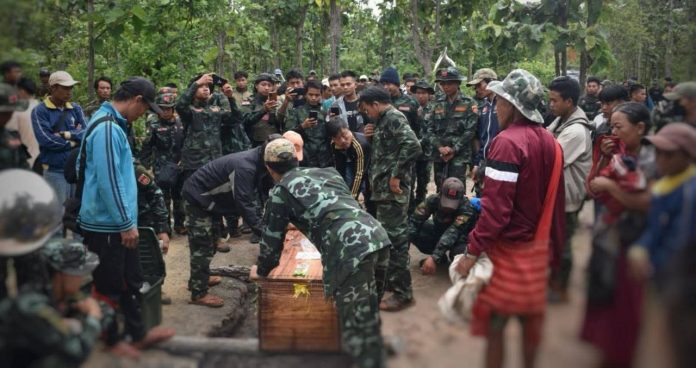
At least seven civilians were killed and over 20 others were injured by an airstrike on mining sites located in Mawchi town of Hpasawng Township, Karenni State, on Wednesday. Hpasawng is located 73 miles (117 km) south of the state capital Loikaw.
“We’ve recorded the regime’s attacks on civilians to take action against the perpetrators later for war crimes,” Banyar Aung, a secretary of the provisional government Karenni Interim Executive Council (IEC), told DVB. The Karenni Nationalities Defence Force (KNDF) gained control of Mawchi on Jan. 28, 2024.
Mawchi is located 19 miles (30 km) west of Hpasawng town, where the Karenni National People’s Liberation Front (KNPLF) and the People’s Defense Force (PDF) reportedly launched an offensive on the remaining two regime Light Infantry Battalions (LIB) 134 and 135 on June 25. Karenni resistance forces claim to have captured 12 regime outposts in Hpasawng since February 2024.
The Tun Myanmar Donation group, which assists people living at Internally Displaced Persons (IDP) camps, accused the regime of targeting civilians. Pho Zaw, the group’s spokesperson, stated that Mawchi was attacked despite no ongoing fighting between regime and resistance forces. Sources in Karenni told DVB that at least 16 civilians have been killed and over 50 have been injured in six airstrikes on Mawchi since March.
The PDF in southern Shan State announced that two of its members were killed by regime forces during fighting in Moebye town of Pekon Township June 23-25. Moebye is located 100 miles (160 km) south of the Shan State capital Taunggyi and 11 miles (17 km) north of Loikaw.
Resistance forces seized Moebye on Nov. 11, 2023, as well as six other towns in Karenni during “Operation 1111”. Pro-regime forces, including the Pa-O National Organization (PNO), launched a counteroffensive to retake control of Moebye in November.
Residents of Pekon Township accused pro-regime forces of setting fire to more than 40 homes in Saungnankhe village on June 24. Residents said that regime forces believed the village was being inhabited by members of the resistance. No casualties were reported. Villagers had already evacuated their homes earlier this month.
The PDF told DVB that over 10,000 residents across 20 villages in southern Shan’s Pekon, Pinlaung and Nyaungshwe townships had to flee their homes as over 1,000 pro-regime troops launched a counteroffensive on June 2. A PDF member said that resistance forces had to withdraw from three positions due to this, but did not disclose the locations.
Min Aung Hlaing urged ethnic armed groups to lay down their arms and join negotiations during his opening address to delegates at regime “peace talks” with ethnic armed groups, which are being held in Naypyidaw June 25-27. The regime has carried out 842 attacks during its post-quake ceasefire which began on April 2. It is set to expire on June 30. Loikaw, Bawlakhe and Hpasawng remain under regime control.
Min Aung Hlaing visits Belarus after opening ‘peace talks’; Earthquake emergency transitions into ‘early recovery’
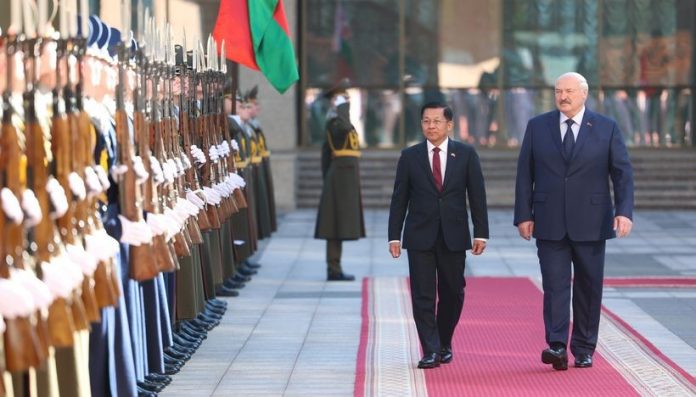
Min Aung Hlaing visits Belarus after opening ‘peace talks’
Regime media reported on Wednesday that Min Aung Hlaing departed Burma for Belarus after his opening address to delegates at the regime “peace talks” with ethnic armed groups in Naypyidaw on June 25. He will attend the 4th Eurasian Economic Forum in Minsk June 26–27, but sources told DVB that he is also expected to visit Buryatia, a Russian republic located in eastern Siberia, after Minsk.
At the opening ceremony of the talks yesterday, Min Aung Hlaing reaffirmed that a “multi-party democratic” system would be re-established in Burma after his planned elections set to begin in December, which he announced during his last visit to Belarus in March. He also told those gathered in Naypyidaw that armed resistance to his regime is “against democracy.”
Min Aung Hlaing’s regime seized power after the military coup that ousted the democratically-elected National League for Democracy (NLD) government on Feb. 1, 2021. BBC Burmese reported on Wednesday that China’s Special Envoy Deng Xijun and U.A.E. Ambassador to Burma Mutaz Al Faheem are in Naypyidaw for the talks, which end tomorrow.
Participants in ‘Flower Strike’ on Aung San Suu Kyi birthday freed
A source close to the regime told DVB that 11 civilians were released on Monday after being arrested in Danubyu Township of Ayeyarwady Region for sharing messages or images to social media commemorating jailed State Counsellor, and NLD leader, Aung San Suu Kyi’s 80th birthday on June 19. Danubyu is located 80 miles (128 km) northeast of the region’s capital Pathein.
The source told DVB on the condition of anonymity that they were made to sign pledges stating if they re-offend they could be re-arrested. A regime media employee in Naypyidaw was also arrested but was accused of sedition on June 21. Residents of Pathein Township told DVB that four women were arrested on June 20 for sharing messages to social media and remained in custody as of June 22.
Over the last four years, people inside Burma and abroad have participated in a “Flower Strike” on June 19 to raise awareness about Aung San Suu Kyi’s detention. She’s been held by the regime since the 2021 coup. Sources told DVB that authorities were ordered to monitor any public campaigns across the country, or online, to mark Aung San Suu Kyi’s 80th birthday.
Earthquake emergency transitions into ‘early recovery’
Nearly three months after the March 28 earthquake, six million people are still in urgent need of humanitarian assistance, according to the U.N. It estimates that 3,800 were killed and over 5,000 were injured, while DVB data reports the number killed at 4,520 with 11,366 injured in the six hardest hit regions of Sagaing, Mandalay, Magway and Bago, as well as Naypyidaw and southern Shan State.
“The devastation caused by the quakes compounded the existing challenges of conflict, displacement and severe humanitarian needs,” said Jorge Moreira da Silva, the executive director of the U.N. Office for Project Services (UNOPS). “Recovery and reconstruction should support Myanmar’s journey to peace and reconciliation. Protection of civilians must be a priority.”
UNOPS, which maintains the largest U.N. staff presence in Burma, reached 500,000 people within weeks of the quake with a reported $25 million USD for emergency shelters, clean water, and the deployment of infrastructure specialists for rapid assessments. Jorge Moreira da Silva paid a three-day visit to the quake zone, adding that greater international support is needed in Burma’s post-quake recovery.
News by Region
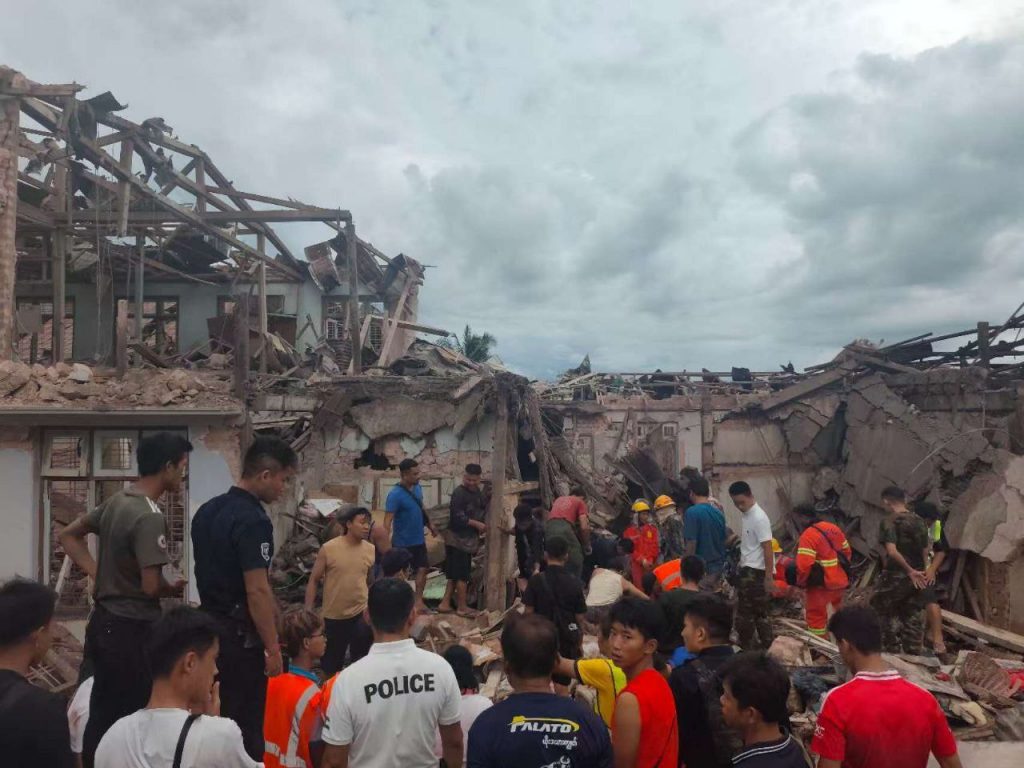
SHAN—Kyaukme Township residents told DVB that four civilians were killed and four were injured by an airstrike on Tuesday. Kyaukme is located 68 miles (109 km) southwest of the regional capital Lashio and 107 miles (172 km) east of Mandalay.
“The first bomb fell near a restaurant. Then another one fell near a mosque,” a Kyaukme resident told DVB. The Ta’ang National Liberation Army (TNLA) confirmed the attack. A total of 10 homes were destroyed. Kyaukme came under TNLA control on Aug. 5.
YANGON—The Solidarity of Trade Union Myanmar (STUM) announced on Tuesday that a female worker at the True Green City factory in Shwepyitha Township was fired on June 23 after filing a complaint against the employer with the regime’s Department of Labour.
The STUM added that the worker was told by her employer on June 17 that she would be dismissed in three months for “being pregnant.” A formal complaint was filed which led to her immediate termination. The woman began working at the factory on May 1, 2024.
NAYPYIDAW—Sources told DVB that the Union Solidarity and Development Party (USDP) Vice Chairperson Hla Tun told members to win all seats in the capital during the upcoming elections in December. The pro-military party governed the country from 2011-16.
USDP Chairperson Khin Yi visited China on June 16 at the “invitation of the Communist Party”. The USDP is one of 10 parties registered with the Union Election Commission (UEC) to contest polls nationwide in 267 out of 330 townships, where the election is expected to take place. Naypyidaw is composed of eight townships.
(Exchange rate: $1 USD = 4,590 MMK)
Union Solidarity and Development Party registers new members in Yangon; Chinland Council amends its constitution
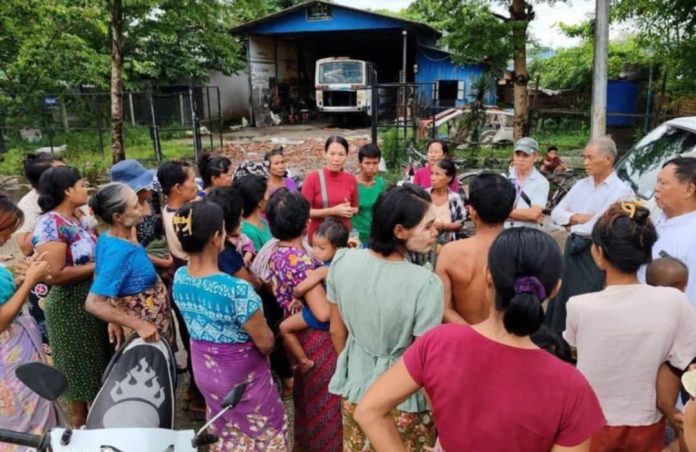
Union Solidarity and Development Party registers new members
Residents in Yangon’s Thanlyin, Dagon Seikkan, as well as South, East and North Dagon townships told DVB that the pro-military Union Solidarity and Development Party (USDP) began its election campaign by luring some residents with the promise of National Registration Cards (NRC) if they register with the party.
The NRC is an identification card that allows the holder to access government services. “The [USDP] is using its old strategy of pursuing homeless people in [Yangon] to register them as party members in return for the NRC,” a South Dagon resident told DVB on the condition of anonymity. A resident from Thanlyin reported that the USDP opened its offices in the township on June 22.
A total of 54 political parties have registered with the Union Election Commission (UEC) to compete in the regime-planned elections, which Min Aung Hlaing said would begin in December. The UEC states polls will be held in 267 out of 330 townships nationwide. Only 10 parties, including the USDP, plan to field candidates in all 267 constituencies.
‘Significant’ increase in use of child soldiers, HRW reports
Human Rights Watch reports that the regime has been recruiting children into armed conflict under the age of 18 since it seized power in a military coup on Feb. 1, 2021 with a “significant” increase since it enforced a conscription law on Feb. 10, 2024. It also highlighted the use of child soldiers in seven ethnic armed groups.
“The Myanmar military has a long and appalling history of using children as porters, guides, and in combat roles,” said Shayna Bauchner, the Asia researcher at Human Rights Watch. “The [regime] should immediately stop using child soldiers and cooperate with U.N. officials to release all child recruits from their forces.”
The U.N. reported that 2,138 “grave violations” against children in Burma were verified in 2024, including the recruitment of children, with about 1,200 additional violations pending verification. Since 2021, it has verified over 1,800 cases of children as young as 12 recruited by pro-regime forces, adding that this may be “underreported due to monitoring challenges and the fear of retaliation.”
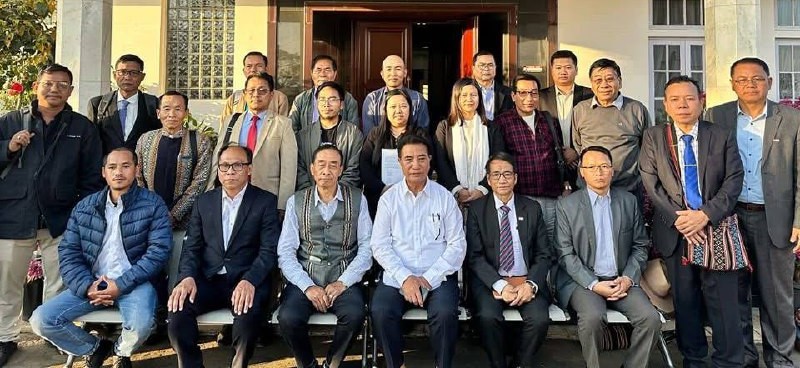
Chinland Council amends its constitution
Khonumthung News, a media agency covering Chinland, reported on June 20 that the Chin National Front (CNF) reduced the number of its members on the Chinland Council from 27 to 15 for the “unity of Chin resistance groups” at a meeting held at its Camp Victoria headquarters on the Burma-India border June 10-11. The meeting’s objective was to amend the Chinland constitution, which was adopted on Dec. 6, 2023.
Salai Bawi Kung, the second vice president of the Chinland Council, told Khonumthung News that the CNF agreed to reduce its number to allow more representatives from other Chin resistance groups. He added that the total number of Chinland Council members is 140. This number includes Chin lawmakers elected in 2020, representatives from the CNF, as well as administrators from all nine townships in Chinland.
The rival Chin Brotherhood said at an online press conference on June 18 that Paletwa Township — under Arakan Army (AA) control since January 2024 — remained part of Chinland and that any disputes with the AA would be resolved through dialogue. The two factions of the Chin resistance have agreed to merge and draft a Chin National Constitution.
News by Region
MAGWAY—At least five people were killed and an unknown number of civilians were injured by airstrikes on Internally Displaced Persons (IDP) camps in seven villages of Pauk Township on Monday. Pauk is located 136 miles (218 km) north of the region’s capital Magway.
“At least 20 bombs [were dropped],” a People’s Defense Force (PDF) spokesperson told DVB. He added that one bomb killed a member of the Civil Disobedience Movement (CDM) and his wife at an IDP camp in Bomae village. Their son survived but was injured.
SAGAING—Residents of Pale Township told DVB that nearly 30,000 civilians living in 24 villages have fled their homes due to fighting between the People’s Liberation Army (PLA) and regime forces since Monday. Pale is located 35 miles (56 km) southwest of the region’s capital Monywa.
A member of People’s Administration Team under the National Unity Government (NUG) in Pale told DVB that nearly 100 regime troops launched a counteroffensive against the PLA in Kandaunt village on June 19. PLA-led resistance forces seized a police station in the village on June 2.
SHAN—The Myanmar National Democratic Alliance Army (MNDAA) announced on Monday that a ceremony was held for its officers who will be stationed in Hsenwi (Theinni) on June 20. Hsenwi is located 31 miles (50 km) northeast of the regional capital Lashio and has been under MNDAA control since November 2023,
A source told DVB on the condition of anonymity that the MNDAA agreed to hand over Hsenwi to the regime in September but no official statement has been made by either side. The MNDAA completed its handover of Lashio to the regime on April 22 as agreed to in its ceasefire signed in January.
(Exchange rate: $1 USD = 4,580 MMK)
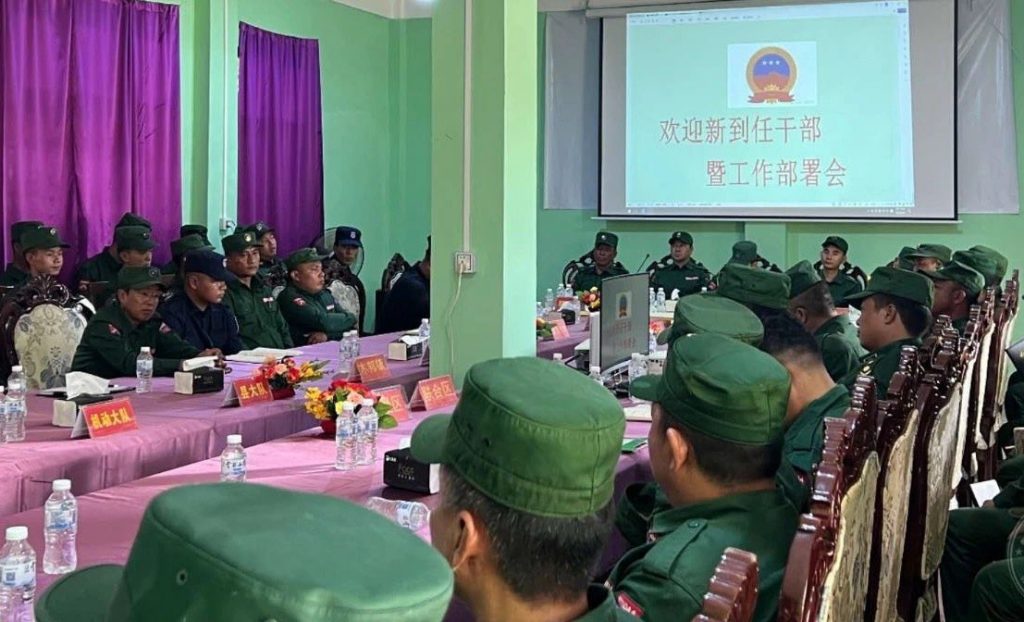
Over 200 foreigners rescued from scam centres still stranded along Myanmar-Thailand border
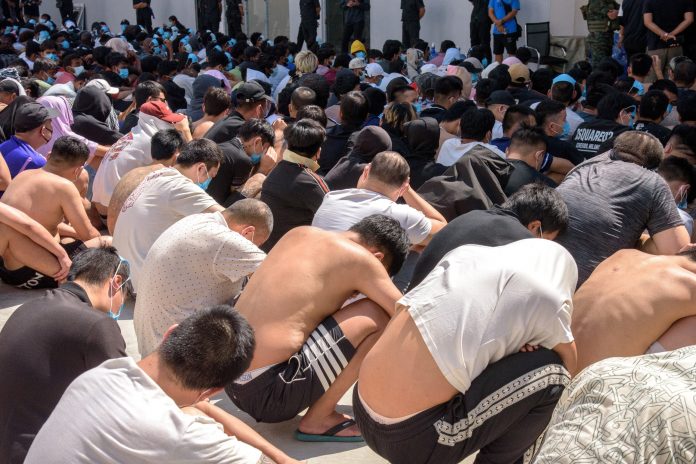
More than 200 foreign nationals rescued from cyber scam centres in eastern Myanmar’s Karen State remain stranded along the country’s border with Thailand, according to a local armed group overseeing their repatriation.
For years criminal networks have trafficked hundreds of thousands of people to scam compounds across Southeast Asia, including many along the Thai-Myanmar border, where victims are forced to work in illegal online schemes, according to the U.N.
The Karen Border Guard Force (BGF), which rebranded itself as the Karen National Army in 2024, is an armed group that claims to have repatriated more than 8,000 foreign nationals after rescuing them from scam centres in areas under its control in Myanmar’s Myawaddy Township in recent months.
The BGF said that it was currently housing 216 people, including citizens of Vietnam, China, the Philippines, and Indonesia.
“We are giving food and medical supplies to these people,” Naing Maung Zaw, the BGF spokesperson, told Reuters on Tuesday.
“Some are even pregnant, and we are providing health care for them,” he added.
Since February, Thailand has cut electricity, internet, and fuel supplies to five Myanmar border areas, including Myawaddy, in a bid to disrupt the scam centres, which have become an escalating regional security concern.
Two residents of Myawaddy, which lies across the Myanmar-Thailand border from Mae Sot, said that there hasn’t been any electricity supplied from Thailand for months.
Power supplied by the Myanmar government has not been stable, leaving much of the settlement – and the scam centres surrounding it – reliant on generators, they said.
Thailand’s embattled Prime Minister Paetongtarn Shinawatra said on Monday that her administration was planning to curtail electricity supplies to illegal operations in Cambodia, following a sharp decline in relations between the neighbours.
“After we cut electricity and water to Myanmar, the number of complaints dropped significantly,” Paetongtarn told reporters.
“We’ve since learned that the criminal activity has moved from Myanmar to Cambodia,” she added. The Cambodian government denies the allegations.
International pressure to shut down the scam centres intensified following the abduction of Chinese actor Wang Xing, who was kidnapped after arriving in Thailand in January.
He was later rescued by Thai police, who located him across the border in Myanmar.
Criminal networks, mainly emanating from China, are known to run several of these scam centres, including those in Myawaddy District, according to the United States Institute of Peace (USIP).
REUTERS


